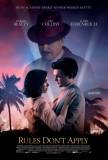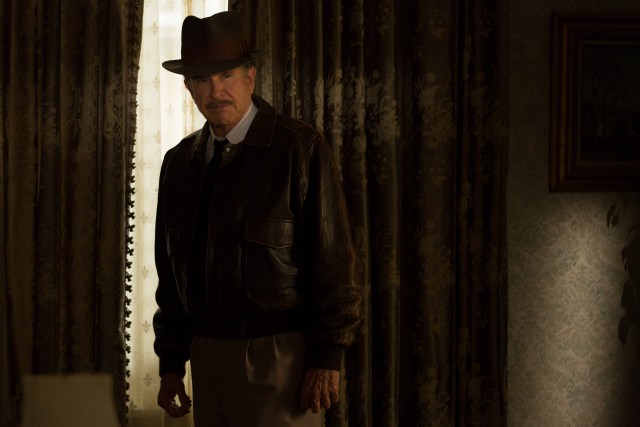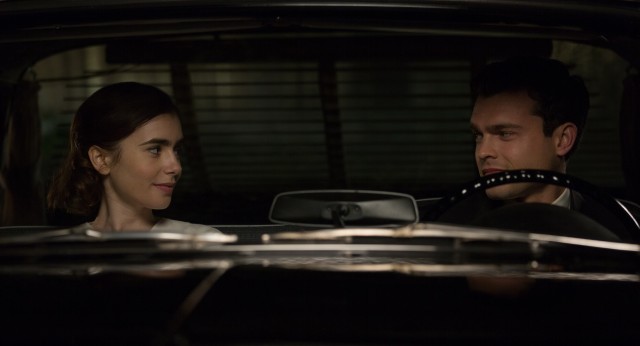Rules Don't Apply Movie Review
 |
Rules Don't Apply
Theatrical Release: November 23, 2016 / Running Time: 126 Minutes / Rating: PG-13 Director: Warren Beatty / Writers: Warren Beatty (story & screenplay), Bo Goldman (story) Cast: Warren Beatty (Howard Hughes), Annette Bening (Lucy Mabrey), Matthew Broderick (Levar Mathis), Lily Collins (Marla Mabrey), Alden Ehrenreich (Frank Forbes), Alec Baldwin (Bob Maheu), Haley Bennett (Mamie), Candice Bergen (Nadine Henly), Steve Coogan (Colonel Nigel Briggs), Taissa Farmiga (Sarah Bransford), Ed Harris (Mr. Bransford), Megan Hilty (Sally), Oliver Platt (Forester), Martin Sheen (Noah Dietrich) |
Eighteen years after Bulworth, Warren Beatty finally returns to the director's chair for Rules Don't Apply, a long-gestating project that also gives him his first theatrical on-screen credit since 2001's Town & Country. Beatty shares story credit with two-time Oscar winner If you still consider Martin Scorsese's 2004 film The Aviator recent enough to render a new Hughes film unnecessary, you may be relieved to learn that Rules is not really a biopic. The film opens with a Hughes quote: "Never check an interesting fact", before acknowledging that names and dates have been changed. The film largely unfolds during a five year period at the start of the 1960s, opening and closing with Hughes in Acapulco being interviewed over the phone about a spurious autobiography claiming he is senile.
Our point of entry to Hughes is Frank Forbes (Alden Ehrenreich), who moves from Fresno to Los Angeles and begins driving contract girls for Mr. Hughes. There are a number of rules that do apply to this job, including never discussing Mr. Hughes, never hitting on the girls, and slowing down when the road dips. Frank doesn't have much to disclose about his boss because weeks and probably months pass since his hiring without ever getting to meet him.
One of Frank's assignments, young Virginia beauty queen and aspiring starlet Marla Mabrey (Lily Collins), is eager to meet Hughes and get a screen test. Until then, she and her mother (Annette Bening, in a small and seemingly obligatory role) make themselves comfortable in one of the dozens of homes Hughes makes available to young female hopefuls. Despite the rules, attraction forms between Marla, a virginal Baptist, and Frank, a churchgoing Methodist who is engaged to his sweetheart since the seventh grade back home.
But, Marla gets to meet Howard Hughes on his terms, sharing frozen dinners with him in darkness and getting him to arrange for that screen test. She also tries alcohol for the first time, which leads to some interesting developments that cloud her future and dim the romantic potential of her and Frank.
Narratively, Rules Don't Apply is all over the place, though. That once focal relationship fades, as does Marla, when the movie shifts to focus on Hughes dodging meeting with potential investors and trying to defy efforts to prove him mentally incompetent that could cost him his leadership role at TWA and possibly even the company he inherited from his father.
We know from The Aviator and assorted biographies that Hughes wrestled some serious demons as far as mental health goes. Beatty isn't interested in getting dark with the facts, preferring to depict the tycoon as a humorously impulsive weirdo, the kind that demands his assistants buy up all the discontinued banana nut ice cream Baskin-Robbins has before it disappears, only to soon move on to french vanilla after the complicated arrangements are made. Rules remains entertaining and light enough to warrant Comedy or Musical classification at the Golden Globes, which is probably its best shot at getting any award season recognition.
Beatty clearly relishes playing Hughes, a role he has dreamt of playing since the early 1970s when their paths crossed in a hotel lobby. And even at age 79, after a decade and half away from the big screen, Beatty still has presence, charisma, and comic timing. But despite his extensive experience behind the camera and a cast loaded with talent (most of which ends up with screentime you could measure in seconds), Beatty can't figure out how to render this passion project coherent and satisfactory. It's part hagiography, part farce, part fictional period love triangle set with famous figures woven in. Despite the 40 years of development, Rules Don't Apply ended up with a fairly modest production budget of $27 million. That results in a production far less sumptuous and splendid than Scorsese's Aviator, a film this neither invites comparisons to nor benefits from that. Scorsese's film cost four times as much, ignoring inflation. This one uses establishing location shots from an array of old movies, the grainy contrast to the clear original content feeling like cost-cutting gone too far.
Bulworth grossed an all right $26.5 million, which eighteen years of inflation adjusts to a respectable $49 M. Rules would probably be lucky to gross closer to the former and even that might be a stretch, with it opening wide today on one of the busiest but most competitive weeks of the moviegoing year, having it court a narrower and much older audience than the likes of Moana and Fantastic Beasts.
|
Related Reviews:
DVDizzy.com | DVD and Blu-ray Reviews | New and Upcoming DVD & Blu-ray Schedule | Upcoming Cover Art | Search This Site
DVDizzy.com Top Stories:
Now in Theaters: Manchester by the Sea Loving Nocturnal Animals Moana Fantastic Beasts and Where to Find Them
Warren Beatty: Dick Tracy Ishtar Lilith The Fortune
Alden Ehrenreich: Hail, Caesar! Beautiful Creatures Blue Jasmine Tetro
Lily Collins: Love, Rosie The English Teacher Stuck in Love Mirror Mirror Priest
Written by Bo Goldman: One Flew Over the Cuckoo's Nest
The Hoax The Rocketeer Café Society The Player
Text copyright 2016 DVDizzy.com. Images copyright 2016 20th Century Fox, Regency Enterprises, Ratpac Entertainment,
Worldview Entertainment Partners, Considered Entertainment, Robson/Orr Entertainment, Shangri-La Entertainment, DeMaresi Films.
Unauthorized reproduction prohibited.

